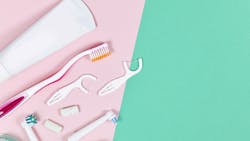The 6 list: Easy ways to take care of your teeth and gums (that don’t have to involve flossing)
"The 6 list" is a recurring feature exploring various topics on oral health, curated for both patients and dental professionals to share with their patients. "6 easy ways to take care of your teeth and gums" was medically reviewed by David R. Rice, DDS, chief editor of DentistryIQ.
Everyone’s had the flossing lecture, and many dental professionals are trying to move beyond it. It’s not that they don’t think flossing is effective—it’s that there are other ways to tweak home care routines that will also encourage healthier teeth and gums. Here’s a look at six easy things you can do for better oral health.
1. Be honest with yourself
A first step to having healthier teeth and gums is to ask yourself some (possibly uncomfortable) questions. Has it been a while since you’ve seen your dentist? Do your gums bleed when you brush? Do you go days without cleaning between your teeth (or skip that completely)? If those answers are “yes,” or even “kind of,” it’s time for some changes to your routines.
2. Use the right toothpaste
With countless brands of toothpaste on the market, how do you know what kind is “right”? Once you know yours meets the recommended 1000 parts per million fluoride, it’s largely a matter of preference. That said, there are definitely toothpastes to use with caution or avoid altogether: those that are too abrasive, claim to whiten, and don’t contain fluoride.
3. Use a rechargeable/electric toothbrush
Many dentists agree—and the research is there to back it up—that electric toothbrushes do a better job at removing plaque and cleaning teeth than manual. And another reason to use one: “I’m not going to lie—they’re more fun to use,” says David Rice, DDS. And if it’s more fun, you’re more likely to use it more often.
4. Get in between your teeth
If you don’t like using dental floss, you don’t necessarily have to. But getting in there to disrupt biofilm—the gluelike microbes that cling to teeth and cause inflammation and disease—is key to your oral health.
Not sure what to use besides floss? There are lots of options to choose from: “I’ll use a water flosser, picks with pipe cleaners on the end called interdental brushes, plastic picks with a pokey end, a rubber tip, and even sometimes string floss,” says Amanda Hill in her popular “Dear Patient” column. “I don’t use each one every day, but I make sure that I’m disrupting the biofilm in between my teeth and around my gums daily.”
5. Brush/scrape your tongue
The tongue is home to numerous types of bacteria that can spread to the teeth and gums, and cleaning it is another means of protecting and improving oral health that doesn’t take a lot of effort—you just might have to get past an urge to gag. Any dental aisle in the supermarket or drugstore and should offer at least a few different types of tongue scrapers or cleaners; you can start by just gently brushing your tongue with your toothbrush.
6. Chew gum
Dentists are asked frequently whether chewing gum is good for their teeth and oral health, and the answer is yes, as long as it’s sugar-free. Chewing gum increases saliva production, decreases the number of cavity-producing bacteria, and fights acid that forms in the mouth as food is broken down.
About the Author
Elizabeth S. Leaver
Digital content manager
Elizabeth S. Leaver was the digital content manager for Endeavor Business Media's dental group from 2021-2024. She has a degree in journalism from Northeastern University in Boston and many years of experience working in niche industries specializing in creating content, editing, content marketing, and publishing digital and magazine content. She lives in the Boston area.
